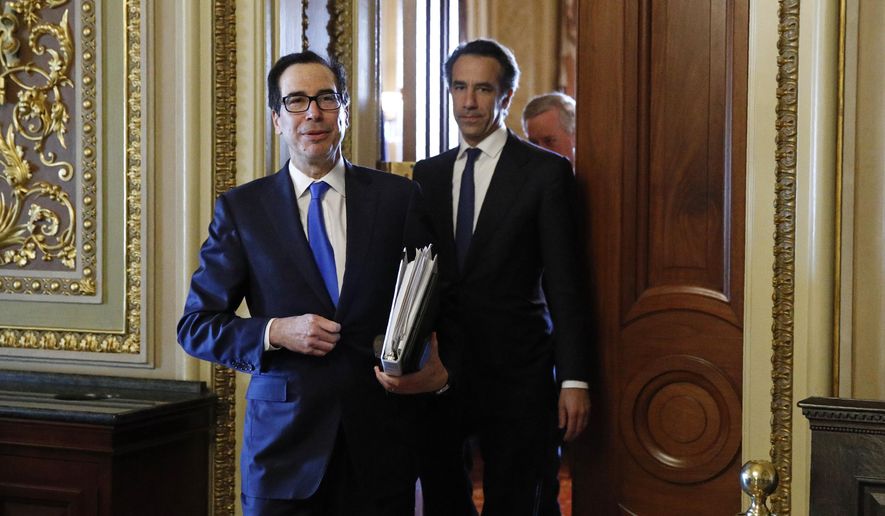The White House and Senate leaders struck a deal early Wednesday for a historic $2 trillion economic rescue package for workers and businesses hard hit by the coronavirus outbreak.
The legislation, expected to be enacted within days, will rush payments to Americans and loans to companies suffering in the economic shutdown aimed at stymying the deadly virus.
Senate Majority Leader Mitch McConnell, Kentucky Republican, described the stimulus bill, which is the biggest in modern U.S. history, as a “wartime level of investment into our nation.”
“The men and women of the greatest country on Earth are going to defeat this coronavirus and reclaim our future,” he said.
Earlier, as the haggling intensified, President Trump billed the rescue legislation as “the biggest and boldest financial relief package in American history.”
The final deal delivered as advertised.
SEE ALSO: Coronavirus stimulus hopes, Donald Trump’s assurance fuel Wall Street surge
The rescue package will send $1,200 checks to most Americans at a cost of $250 billion. It set up a $367 billion loan program to help small businesses make payroll and a $500 billion in subsidized loans for big businesses.
The aid includes $250 billion in unemployment insurance benefits, $150 billion of stimulus spending for states and local governments, and $130 billion for hospitals.
The deal bars any of the payouts going to President Trump, Vice President Mike Pence, Cabinet officials, Congress members or any of their immediate family.
The aid package took days of fierce negotiations and included several false starts, with Senate Democrats twice derailing moves to advance a deal in the chamber.
Treasury Secretary Steven T. Mnuchin and White House Legislative Affairs Director Eric Ueland led the administration effort at the Capitol, acting as go-betweens with Mr. McConnell and Senate Minority Leader Charles E. Schumer, New York Democrat.
“Ladies and gentlemen, we are done. We have a deal,” Mr. Ueland told reporters at the Capitol after emerging from the negotiations in the wee hours Wednesday morning.
SEE ALSO: Tom Cotton predicts swift passage of $2 trillion stimulus package
Mr. Schumer called the deal a compromise and far from perfect. But he said the tough negotiations produced legislation that reflected “Democratic priorities.”
He also used wartime imagery to describe the effort, calling it “a Marshall Plan for public health workers and hospitals on the front lines, and putting workers first.”
“To all Americans I say: Help is on the way. Big help and quick help,” Mr. Schumer said on the Senate floor after the deal was announced.
Under the deal, the $1,200 checks would go to individuals earning $75,000 in adjusted gross income or less. Married couples earning up to $150,000 would get $2,400. Families also would pocket $500 per child.
Democrats said the package would help replace the salary of furloughed workers for four months, rather than the three months first proposed. Furloughed workers would get whatever amount a state usually provides for unemployment, plus a $600 per week add-on, with gig workers like Uber drivers covered for the first time.
Republicans won the inclusion of an “employee retention” tax credit that’s estimated to provide $50 billion to companies who retain employees on payroll and cover 50% of workers’ paychecks. Companies would also be able to defer payment of the 6.2% Social Security payroll tax.
Democrats pointed to gains for hospitals, additional oversight of the huge industry stabilization fund, and money for cash-strapped states. A companion appropriations package ballooned as well, growing from a $46 billion White House proposal to more than $300 billion, which dwarfs earlier disasters — including Hurricane Katrina and Superstorm Sandy combined.
To provide transparency, the package is expected to create a new inspector general and oversight board for the corporate dollars, much as was done during the 2008 Troubled Asset Relief Program bank rescue, officials said.
• This article is based in part on wire service reports.
• S.A. Miller can be reached at smiller@washingtontimes.com.




Please read our comment policy before commenting.